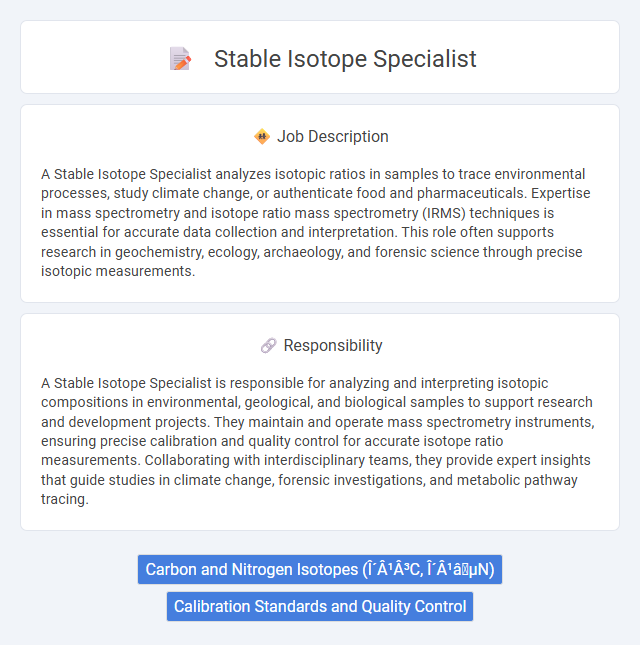
A Stable Isotope Specialist analyzes isotopic ratios in samples to trace environmental processes, study climate change, or authenticate food and pharmaceuticals. Expertise in mass spectrometry and isotope ratio mass spectrometry (IRMS) techniques is essential for accurate data collection and interpretation. This role often supports research in geochemistry, ecology, archaeology, and forensic science through precise isotopic measurements.
Individuals with strong analytical skills and a background in chemistry or geology are likely suitable for a stable isotope specialist role. Those comfortable working in laboratory settings and handling intricate instruments may find the job a good fit. People who prefer routine tasks or lack interest in scientific research might be less suitable for this profession.
Qualification
A Stable Isotope Specialist typically holds an advanced degree in geochemistry, environmental science, or a related field, emphasizing isotopic analysis techniques such as mass spectrometry. Proficiency in interpreting isotopic data for applications in climate research, hydrology, or biology is essential, along with hands-on experience in laboratory settings. Strong analytical skills, attention to detail, and the ability to manage complex datasets enhance the specialist's effectiveness in tracing elemental pathways and environmental processes.
Responsibility
A Stable Isotope Specialist is responsible for analyzing and interpreting isotopic compositions in environmental, geological, and biological samples to support research and development projects. They maintain and operate mass spectrometry instruments, ensuring precise calibration and quality control for accurate isotope ratio measurements. Collaborating with interdisciplinary teams, they provide expert insights that guide studies in climate change, forensic investigations, and metabolic pathway tracing.
Benefit
Working as a stable isotope specialist probably offers significant benefits in advancing research accuracy and environmental analysis capabilities. This role is likely to enhance one's expertise in geochemistry, ecology, and forensic science by applying precise isotopic techniques. The specialized skills developed may improve job prospects in academic, governmental, and industrial sectors focused on innovative scientific solutions.
Challenge
Stable isotope specialists likely face the challenge of accurately interpreting complex isotopic data to resolve environmental and geochemical questions. They probably need to stay updated with advanced analytical techniques and maintain precision under varying sample conditions. Mastery of both laboratory procedures and geological or biochemical contexts is expected to be essential for overcoming these difficulties.
Career Advancement
Stable isotope specialists can advance their careers by gaining expertise in mass spectrometry techniques and isotopic analysis, which are critical in environmental science, geology, and forensic research. Progression often involves roles like senior scientist, laboratory manager, or research director, supported by continuous education and publications in peer-reviewed journals. Networking within professional societies and securing grants for innovative projects further enhances opportunities for leadership and innovation in this specialized field.
Key Terms
Carbon and Nitrogen Isotopes (δ¹³C, δ¹⁵N)
Stable isotope specialists focus on analyzing carbon (d13C) and nitrogen (d15N) isotopic ratios to trace ecological processes, dietary patterns, and environmental changes. Proficiency in mass spectrometry techniques and isotope ratio mass spectrometers (IRMS) is essential for accurate measurement and data interpretation. Expertise in biogeochemical cycles and sample preparation protocols enhances the reliability of d13C and d15N isotopic data for research in fields like paleoecology, forensics, and climate science.
Calibration Standards and Quality Control
Stable isotope specialists ensure precise calibration of mass spectrometers by developing and maintaining calibration standards that uphold analytical accuracy. They implement rigorous quality control protocols to monitor instrument performance, detect anomalies, and guarantee reproducible isotope ratio measurements. Their expertise supports reliable isotopic data critical for research in geochemistry, environmental science, and forensic analysis.
 kuljobs.com
kuljobs.com